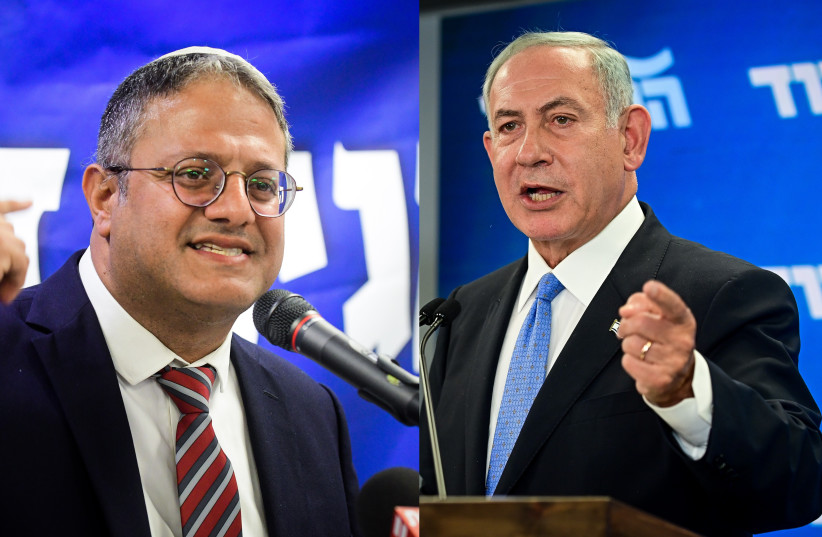The latest spat between Prime Minister Benjamin Netanyahu and National Security Minister Itamar Ben-Gvir may indicate that cooperation between the two is unsustainable unless the latter can learn to exhibit restraint.
Ben-Gvir was not present at a security meeting that Netanyahu held on Sunday with other officials. The minister was intentionally not invited, according to media reports, even though the meeting involved issues under his authority.
Reports indicating a deteriorating relationship were immediately dismissed by the Prime Minister’s Office.
“The prime minister held a routine meeting with the defense minister and other defense system officials from the different sectors concerning Israel,” the PMO statement said on Sunday. “The meeting focused on Iran and didn’t touch on public security at all. Any attempt to incite between the prime minister and the national security minister and essentially blame it on the prime minister is false and intentional. The prime minister and Minister Ben-Gvir will continue to cooperate fully for the good of all Israeli citizens.”
While the PMO tried to make it seem like everything was in order, Ben-Gvir’s side indicated otherwise. Sources close to the national security minister told N12 that Netanyahu had decided not to invite Ben-Gvir to the meeting after learning that he intended to raise the issue of security prisoners – a matter on which they have disagreed consistently over the past few weeks.
Sources also told Army Radio that Netanyahu’s Chief of Staff, Tzachi Braverman, had urged the prime minister to snub Ben-Gvir.

Troubles in the coalition
This spat is only the latest in a series of disagreements between the two that began even before the government was sworn in nine months ago.
In interviews Netanyahu gave to N12 before the government was formed, he categorically said that while Ben-Gvir would be in the coalition, he would absolutely not become a minister.
Nevertheless, Ben-Gvir became the national security minister in a decision that many saw as controversial, considering his past convictions for supporting terrorism.
Two months later, Ben-Gvir and Finance Minister Bezalel Smotrich clashed with the coalition over their demand that Netanyahu keep the promises made to them in the coalition agreements. These included being given some administrative powers in Area C of the West Bank, which is under Israel’s authority as per the Oslo Accords.
Ben-Gvir was promised power over the Border Police’s Judea and Samaria Division. To pressure Netanyahu, he circulated a draft of an issue he was planning to raise in the following cabinet meeting.
A month later, in March, Ben-Gvir threatened to quit the government after talk circulated of a freeze in judicial reform legislation due to the ongoing mass protests. To avoid this, Netanyahu gave him a signed commitment to form a national guard.
The threat to quit came again in May when Ben-Gvir accused the government of not implementing the “fully right-wing policy” he had expected in response to rocket fire from Gaza. At a faction meeting in Sderot, he dared Netanyahu to fire him. In response, Likud told him he was welcome to resign if unhappy with the direction taken by the government.
Tensions rose between the two men again in September regarding multiple issues. The first came after Ben-Gvir instructed prisons to limit family visits for Palestinian security prisoners. Following prisoners’ threats to fight the new directive, the PMO claimed that no decision had been made on the matter, meaning that Ben-Gvir had not coordinated with Netanyahu. The issue remained a matter of contention as Ben-Gvir demanded that the conditions of security prisoners be worsened ahead of Rosh Hashana. Netanyahu refused.
Ben-Gvir once again expressed ire toward the prime minister last month after a report claimed that the Palestinian Authority had been given armored vehicles and weapons from Israel. The national security minister immediately demanded clarification from Netanyahu, who said the reports were false.
While Ben-Gvir accepted Netanyahu’s explanation, he said that his party would no longer be bound by coalition discipline concerning Knesset votes. With the winter session beginning in a couple of weeks, this could mean that his Otzma Yehudit (Jewish Strength) party will vote against the government.
With the turbulence of the first nine months of the coalition – especially with regard to Ben-Gvir – it is becoming clear that the situation is reaching a boiling point. This leaves Netanyahu and Ben-Gvir with three options: Netanyahu fires Ben-Gvir, Ben-Gvir quits, or Ben-Gvir learns to work with Netanyahu and exhibit restraint.
If Netanyahu fires him, the national security minister will likely not stay in the coalition, and without Ben-Gvir’s six seats, the government would lose its majority. Netanyahu is unlikely to pull the plug unless absolutely necessary, as recent polls indicate that if Israel goes to elections now, Likud would not win and National Unity party leader Benny Gantz would come out on top.
Ben-Gvir knows this. He also knows that considering the animosity between the current coalition and the opposition, he stands almost no chance of being included in a Gantz-led government. As such, he too is not likely to quit. Indeed, to date, he has not followed up on his threats to do so.
The third option is for Ben-Gvir to exercise restraint in order to minimize future disagreements with Netanyahu – something he showed he was capable of doing last week. The minister had been planning a gender-segregated prayer service in Dizengoff Square in response to fights between congregants and protesters on Yom Kippur in the same location over the issue of segregation. After announcing the event, his fellow coalition members urged him to cancel it, as it would be seen as a provocation. Ben-Gvir eventually conceded, perhaps showing that he understands which lines he should not cross.
Israel will have to wait and see whether the discord between Netanyahu and Ben-Gvir will overcome their determination to stay in power.
